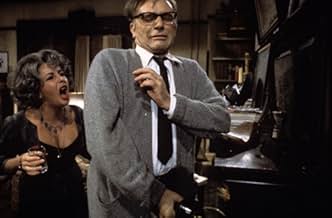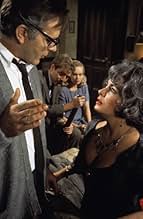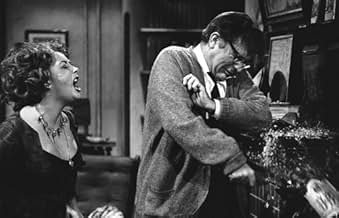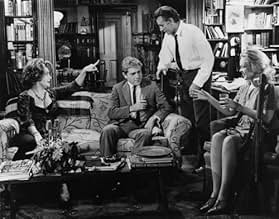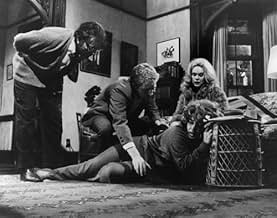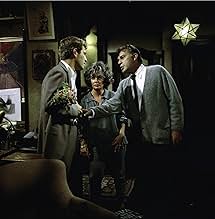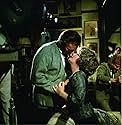एक कड़वा, उम्र बढ़ने वाला जोड़ा, शराब की मदद से, एक परेशान रात के दौरान एक-दूसरे के प्रति पीड़ा और भावनात्मक दर्द को बढ़ावा देने के लिए अपने युवा गृहिणियों का उपयोग करता है।एक कड़वा, उम्र बढ़ने वाला जोड़ा, शराब की मदद से, एक परेशान रात के दौरान एक-दूसरे के प्रति पीड़ा और भावनात्मक दर्द को बढ़ावा देने के लिए अपने युवा गृहिणियों का उपयोग करता है।एक कड़वा, उम्र बढ़ने वाला जोड़ा, शराब की मदद से, एक परेशान रात के दौरान एक-दूसरे के प्रति पीड़ा और भावनात्मक दर्द को बढ़ावा देने के लिए अपने युवा गृहिणियों का उपयोग करता है।
- 5 ऑस्कर जीते
- 22 जीत और कुल 26 नामांकन
फ़ीचर्ड समीक्षाएं
10OttoVonB
Ailing couple George (Burton) and Martha (Taylor) invite a young couple over for a late-night drink - much to quiet and repressed George's annoyance - and what starts off as a twisted game by sultry Martha to annoy her husband and get her way with young stud Nick (George Segal) ends up in a horrific duel of wits.
Adapted from the play and boasting very few locations, "Virginia Woolf" is notable for many unsuspected reasons. Designed for the stage, the film makes the story uniquely cinematic and tense, amped up by stunning photography (in Black and White, a daring choice in 1966). The younger leads are superb, but Burton and Taylor still manage to walk away with film, giving stunning renditions of the world's most demented couple. They make the surreal dialogue hurt and touch in ways never thought possible.
Though there are countless reasons to recommend this jewel of a film, there are also reasons why one would wish to avoid it. This is the kind of film that makes you feel like having a showing (or a very concentrated drink) to wash away the grit and human evil and pain absorbed. You'll feel dirty, but in a way you'll also feel enlightened: that a small character film can carry more punch than any explosion-packed blockbuster out there is a thing of beauty indeed!
Adapted from the play and boasting very few locations, "Virginia Woolf" is notable for many unsuspected reasons. Designed for the stage, the film makes the story uniquely cinematic and tense, amped up by stunning photography (in Black and White, a daring choice in 1966). The younger leads are superb, but Burton and Taylor still manage to walk away with film, giving stunning renditions of the world's most demented couple. They make the surreal dialogue hurt and touch in ways never thought possible.
Though there are countless reasons to recommend this jewel of a film, there are also reasons why one would wish to avoid it. This is the kind of film that makes you feel like having a showing (or a very concentrated drink) to wash away the grit and human evil and pain absorbed. You'll feel dirty, but in a way you'll also feel enlightened: that a small character film can carry more punch than any explosion-packed blockbuster out there is a thing of beauty indeed!
10Rathko
An undisputed classic that chronicles every appalling moment of a drunken night in hell as middle-aged George and Martha tear each other, and their guest, to pieces.
Elizabeth Taylor proves categorically that she was a truly great actress. Her Oscar-winning performance as the psychologically tormented Martha is one of the greatest performances in the history of cinema. Taylor's imperceptible shifting from sadism to tenderness, from bullying condescension to exhausted vulnerability, is a masterclass in character building. Martha is a truly monstrous character, and yet Taylor is able to imbue her with sympathy, allowing you brief glimpses of the warm and lovable woman she could have been.
Richard Burton is equally magnificent as George; an ageing, failing college professor whose initial meekness gives way to a raging torment all of his own. His verbal sparring with Taylor, like two pit-bulls in the ring of an endless and bloody dogfight, has become legendary. Every word drips with malice and contempt, every sentence is designed to cut the deepest wound. At times, it becomes painful to watch, but like true train-wreck television, you cannot drag yourself away from the inevitably terrible conclusion.
Quite possibly, this is as close to perfect as movies can get; beautifully written dialogue, deeply complex characters, an evolving and suspenseful storyline, beautiful photography, and a wonderfully understated score by Alex North. Nominated for 13 Academy Awards in 1967, but lost out to A Man for All Seasons and Born Free to win only 5.
"Who's Afraid of Virginia Woolf?" "I am."
Elizabeth Taylor proves categorically that she was a truly great actress. Her Oscar-winning performance as the psychologically tormented Martha is one of the greatest performances in the history of cinema. Taylor's imperceptible shifting from sadism to tenderness, from bullying condescension to exhausted vulnerability, is a masterclass in character building. Martha is a truly monstrous character, and yet Taylor is able to imbue her with sympathy, allowing you brief glimpses of the warm and lovable woman she could have been.
Richard Burton is equally magnificent as George; an ageing, failing college professor whose initial meekness gives way to a raging torment all of his own. His verbal sparring with Taylor, like two pit-bulls in the ring of an endless and bloody dogfight, has become legendary. Every word drips with malice and contempt, every sentence is designed to cut the deepest wound. At times, it becomes painful to watch, but like true train-wreck television, you cannot drag yourself away from the inevitably terrible conclusion.
Quite possibly, this is as close to perfect as movies can get; beautifully written dialogue, deeply complex characters, an evolving and suspenseful storyline, beautiful photography, and a wonderfully understated score by Alex North. Nominated for 13 Academy Awards in 1967, but lost out to A Man for All Seasons and Born Free to win only 5.
"Who's Afraid of Virginia Woolf?" "I am."
Who's afraid of Virgina Wolf? contains what I would call the most outstanding old school actor/audience experience I'ver ever seen. This movie is 131 minutes long and only contains 5 actors, on of which hardly gets any screen time and the two leading characters played by the famous couple Richard Burton and Elizabeth Taylor are on screen almost the whole time. Also this movie only contains a couple of locations so the whole project depends almost entirely on these two actors superb performance. The two of them fight almost the entire movie and it never gets boring for a second. Well, I gave this movie ten stars..... definitely a classic must see if you're interested in acting.
This is still an exceptional film from the 1960s. Though some of the epithets are obviously softening much stronger words, the language is frank and brutal, Martha's bludgeoning body-blows balanced by George's icepick thrusts. Edward Lehman's respectful screenplay gently opens up Edward Albee's one-set play while keeping a certain claustrophobic atmosphere. Mike Nichols' first directing effort is stunning in its lack of artifice; rarely do you feel that the director has done much more than turn on the camera and watch four actors, all at the top of their game, tear into their roles. George Segal's work in this movie is criminally underrated, but his reactive work as studly, ultimately disappointing Nick should be mandatory study by all young actors. Sandy Dennis' fluttery turn as mousy, wifey Honey is powerful also; a lot more is going on than you might think. Richard Burton is staggering as George ("Georgie Porgie Put-upon Pie"), and his performance demonstrates the magic that he could bring to a worthy role. Elizabeth Taylor's work here still astounds. The physical transformation she undertook to become aging harpy Martha is amazing enough, but her performance seems to channel a hurricane's force and fury. By turns hilarious, maddening and then, at the end, exhausted and defeated yet again, Taylor demonstrates acting, particularly film acting, at its best. The film is by no means easy or "Hollywood" in feel-- the audience is as exhausted as the characters at the end. But this was a bracing, necessary antidote to the impossible ideal of marriage usually portrayed in the movies. A towering film.
Edward Albee's award winning play, Who's Afraid of Virginia Woolf ran for 664 performances on Broadway and just closed down when this film version made its debut in 1966. The Broadway play was set entirely in the living room of George and Martha's home and starred Uta Hagen, Arthur Hill, Melinda Dillon, and George Grizzard. All eminently respectable players, but none of them exactly movie box office.
This film was destined to make money when the most publicized couple of the decade, Elizabeth Taylor and Richard Burton, chose it as a star vehicle for themselves. Of course what was not clear was how well a one stage play would adapt to film.
It adapted very well and went quite beyond one stage. The action of the film moved effortlessly to an all night diner at one point with some stops along the way. You'd hardly know the story as originally told only had one setting.
There's no real plot to it. For reasons I can't fathom this middle aged and bitter couple George and Martha have a younger couple, Nick and Honey, over to their house at two in the morning. I don't know about you, but I'm usually not my best at that time. Also they had just come from a party at Martha's father's house. Martha's dad is the president of a college and George teaches there. Nick and Honey are a newly hired professor and his wife.
The late night and the liquor bring out the worst in everybody. A whole lot of ugly truths get told.
Who's Afraid of Virginia Woolf was the summit of the professional team of Elizabeth Taylor and Richard Burton. Playing against type, Elizabeth Taylor got her second Oscar the one she felt she earned. She always disparaged the one received for Butterfield 8 as it came on the heels of her well publicized pneumonia bout.
In fact all four members of the cast were nominated with Sandy Dennis winning Best Supporting Actress. Ironically Richard Burton didn't win, losing to Paul Scofield for A Man for All Seasons. I guess the Academy voters figured Burton would get another shot. He never brought home the big prize though.
George Segal usually gets overlooked. This film and Ship of Fools was the start of his long career, but no Oscar for him either.
Who's Afraid of Virginia Woolf is quite the indictment against marriage, especially after the love has died. It's far from the whole story of marriage. There are many who stay married longer than George and Martha and happily. But it wasn't in Edward Albee's life experience to draw from.
But this should be seen to see Liz and Dick at their very best.
This film was destined to make money when the most publicized couple of the decade, Elizabeth Taylor and Richard Burton, chose it as a star vehicle for themselves. Of course what was not clear was how well a one stage play would adapt to film.
It adapted very well and went quite beyond one stage. The action of the film moved effortlessly to an all night diner at one point with some stops along the way. You'd hardly know the story as originally told only had one setting.
There's no real plot to it. For reasons I can't fathom this middle aged and bitter couple George and Martha have a younger couple, Nick and Honey, over to their house at two in the morning. I don't know about you, but I'm usually not my best at that time. Also they had just come from a party at Martha's father's house. Martha's dad is the president of a college and George teaches there. Nick and Honey are a newly hired professor and his wife.
The late night and the liquor bring out the worst in everybody. A whole lot of ugly truths get told.
Who's Afraid of Virginia Woolf was the summit of the professional team of Elizabeth Taylor and Richard Burton. Playing against type, Elizabeth Taylor got her second Oscar the one she felt she earned. She always disparaged the one received for Butterfield 8 as it came on the heels of her well publicized pneumonia bout.
In fact all four members of the cast were nominated with Sandy Dennis winning Best Supporting Actress. Ironically Richard Burton didn't win, losing to Paul Scofield for A Man for All Seasons. I guess the Academy voters figured Burton would get another shot. He never brought home the big prize though.
George Segal usually gets overlooked. This film and Ship of Fools was the start of his long career, but no Oscar for him either.
Who's Afraid of Virginia Woolf is quite the indictment against marriage, especially after the love has died. It's far from the whole story of marriage. There are many who stay married longer than George and Martha and happily. But it wasn't in Edward Albee's life experience to draw from.
But this should be seen to see Liz and Dick at their very best.
क्या आपको पता है
- ट्रिवियाThis became the first movie in Academy Awards history since Cimarron (1931) to be nominated for every Academy Award category in which it was eligible, including Best Adapted Screenplay (Ernest Lehman), Director (Mike Nichols), all of the acting categories (Richard Burton, Dame Elizabeth Taylor, George Segal and Sandy Dennis) and Picture of the Year (Ernest Lehman).
- गूफ़The four characters stop at a bar after the first soiree at George's house. It is clearly after 2:00 a.m., since the time was stated during the first segment. No bars, however, would have been open after 1 or 2 a.m. in the New England states, where the film is set.
- कनेक्शनEdited from The Letter (1940)
- साउंडट्रैकWho's Afraid of Virginia Woolf?
(to the tune of "Here We Go Round the Mulberry Bush")
Traditional English melody
Original lyrics ("Who's Afraid of the Big Bad Wolf?") by Frank Churchill and Ann Ronell; modified by Edward Albee
Performed by Elizabeth Taylor
टॉप पसंद
रेटिंग देने के लिए साइन-इन करें और वैयक्तिकृत सुझावों के लिए वॉचलिस्ट करें
विवरण
- रिलीज़ की तारीख़
- कंट्री ऑफ़ ओरिजिन
- भाषाएं
- इस रूप में भी जाना जाता है
- ¿Quién le teme a Virginia Woolf?
- फ़िल्माने की जगहें
- उत्पादन कंपनियां
- IMDbPro पर और कंपनी क्रेडिट देखें
बॉक्स ऑफ़िस
- बजट
- $75,00,000(अनुमानित)
- US और कनाडा में सकल
- $2,80,00,000
- दुनिया भर में सकल
- $2,80,06,929
- चलने की अवधि2 घंटे 11 मिनट
- रंग
- ध्वनि मिश्रण
- पक्ष अनुपात
- 1.85 : 1
इस पेज में योगदान दें
किसी बदलाव का सुझाव दें या अनुपलब्ध कॉन्टेंट जोड़ें

टॉप गैप
By what name was Who's Afraid of Virginia Woolf? (1966) officially released in India in English?
जवाब

